With thought-provoking discussions on how to build equitable technology and foster inclusion of all employees, and talks from CEOs, there were many highlights from the Catalyst 2021 Awards.
The 2021 Catalyst Awards was the largest event in our 59-year history. To understand the depth and breadth of this year’s virtual and global Awards Program and Celebration, consider these numbers:
- Nearly 7,000 tickets sold to attendees
- 80+ speakers, including 22 CEOs of multinationals
- 15 panel discussions in two days
On March 17 and 18, Catalyst Awards was packed with thoughtful and provocative conversations by some of the most prominent, accomplished business leaders in the world, covering everything from how to build equitable artificial intelligence to how to better leverage employee resource groups.
It was an event that celebrated successes: Catalyst honored the Award-winning initiatives by Barilla and RBC to accelerate progress for women in the workplace. “Their singular commitment to increasing the representation of women in their leadership ranks—and holding themselves accountable to develop and empower talent in the face of challenges—demonstrates that progress won’t pause,” said Catalyst President & CEO Lorraine Hariton.
Julie Sweet, CEO of Accenture, was Event Chair for this year’s Awards program. “The world is awakening to an incredible opportunity to reimagine and rebuild responsibly and sustainably and to transform our global economy into one that works for the benefit of all,” she said. Sweet was recently elected as Chair of the Catalyst Board of Directors, succeeding previous Board Chair Marillyn Hewson, former Chairman, President, and CEO of Lockheed Martin.
Below are some of the key takeaways from the 2021 Catalyst Awards.
Diversity, Equity, and Inclusion are Business Imperatives
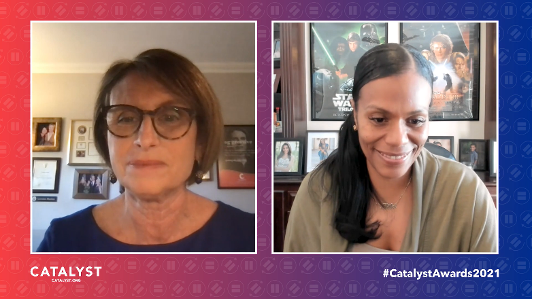
When George Floyd was murdered miles from Target’s headquarters, the company was able to spring into action, supporting staff and the community through its long-standing DEI practices. A racial equity action committee was established in 2020, noted Kiera Fernandez, Target Corporation’s Senior Vice President, Human Resources and Chief Diversity and Inclusion Officer, during the opening keynote conversation with Hariton. “We run our diversity, equity, and inclusion business like any other business function. We set goals, we have metrics, we look at the data, we hold ourselves accountable,” said Fernandez.
Storytelling and Empathy are Skills We All Need to Cultivate
In a discussion with Catalyst’s Lauren Pasquarella Daley, PhD, Gian Power, Founder of TLC Lions, an organization that partners with companies to support inclusion, mental health, and talent development, emphasized the connection among empathy, storytelling, and inclusion. “Storytelling doesn’t make us less professional; it makes us more human. Taking the time to empathize and understand our colleagues creates more inclusive and productive workplaces.”
Advancing Women Requires an Intersectional Approach
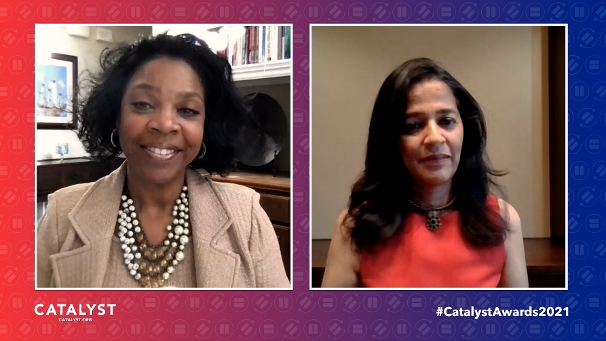
The concrete ceiling for women of color is real, and pervasive. In the closing keynote, Revathi Advaithi, CEO of Flex, and Dr. Sheila Robinson, Founder of Diversity Woman Media, spoke frankly about how to accelerate progress. Among the takeaways: Leaders must approach all DEI initiatives with an intersectional lens, and individuals should start building their networks from the time they graduate from college. “Support one another. Pull each other up. And do it in every place you see inequity in this world,” Advaithi said.
Action From Leaders is Critical

RBC’s global culture change initiative, Speak Up For Inclusion, helped increase the representation of women in leadership and at the board level, and helped advance the careers of its high-potential women and people of color. Accepting the 2021 Catalyst Award on behalf of RBC, CEO Dave McKay reflected on the bank’s continuing journey to build one of the world’s most diverse and inclusive workplaces. “It’s about more than just commitment from the top. It’s about action from the top.”
The Time for Action is Now
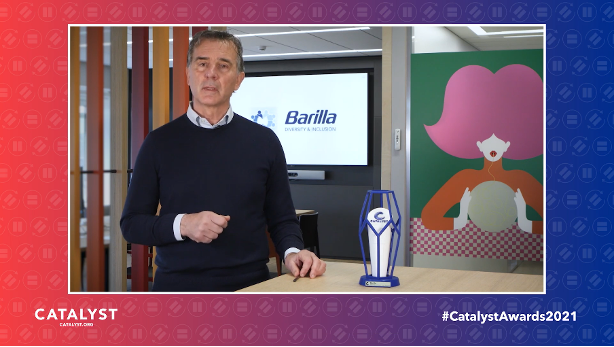
The family-owned company’s journey to inclusion was nothing short of remarkable. Claudio Colzani, CEO of Barilla, accepted the 2021 Catalyst Award for his company’s initiative, while senior leaders laid out how they became a model of inclusion for LGBTQ+ employees and achieved gender pay equity. “We are not here just to celebrate an accolade, but because we have a role to play in society and in the communities in which we eat, live, and work,” said Colzani.
Value Diversity as Much as the Bottom Line
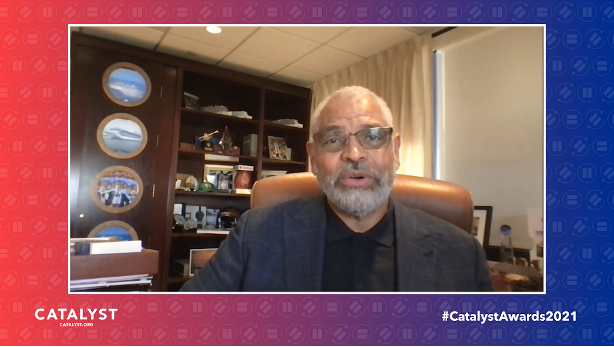
Arnold W. Donald, President and Chief Executive Officer of Carnival Corporation, spoke about how he challenged his leadership team to take action on racial and gender equity. While the murders of George Floyd and Breonna Taylor highlighted racial justice issues, Donald observed, “There has always been a need for prioritizing human capital in the space of social justice. You have to value diversity as much as you value profit.”
Use Measurement to Drive Change
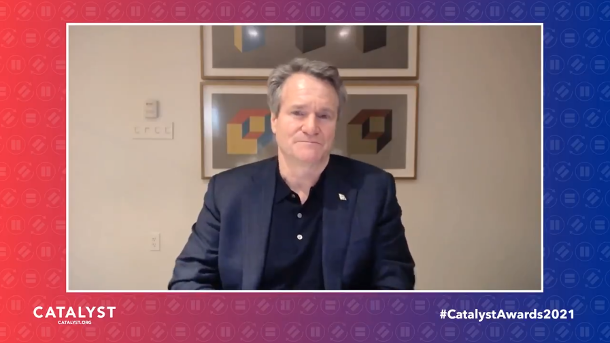
The importance of measurement was a common theme throughout. Brian Moynihan, Chairman & CEO of Bank of America, explained why his company uses a diversity and inclusion index to go beyond representation and measure inclusion. “Diversity is statistical; inclusion is the heart and how you feel,” he said.
In a conversation with Marie Konstance, Project Lead on the Gender and Diversity KPI Alliance, an initiative that promotes the adoption of key performance indicators (KPIs) to measure pay and representation, Kelly Grier, US Chair and Managing Partner and Americas Managing Partner of EY, noted measurement provides accountability. “All of my direct reports have specific DEI goals, and they’re held accountable. Every time we look at appointments, there’s an absolute mandate that we look at a diverse slate.” EY monitors the effectiveness of its policies with an employee dashboard and publicly discloses their diversity statistics.
Artificial Intelligence Should Be Bias-Free
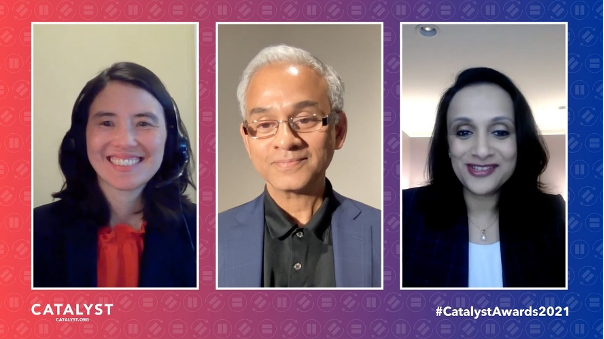
Tiger Tyagarajan, CEO of Genpact, noted that artificial intelligence can perpetuate and reinforce human biases and it is essential that organizations focus on creating equitable technology. He said seeing how many leaders, including those at the 2021 Catalyst Awards, are actively engaged in these issues gave him confidence that “we will get to real equity around the world of technology.”
Business Leaders Have the Ability to “Move Humanity Forward”
In the closing keynote, Hamdi Ulukaya, Founder & CEO, Chobani, offered an inspiring call to action for business leaders. “Business is a massive force. I don’t see any other platform that’s as impactful,” he said, concluding, “I welcome people to join this world of the business community so we can move humanity forward and we can make the world better for our children.”
From 1987 to 2019, the Catalyst Awards Conference and Dinner—recognizing innovative organizational initiatives that accelerate progress for women in the workplace—were held annually in person in New York City. In 2021, the event moved online and featured special programming throughout the month of March, including weekly virtual networking sessions. If you registered to attend but missed any of the sessions, you can view them on demand now through the end of June.
We are particularly grateful to this year’s Presenting Sponsor, Target.
Learn how to apply for the 2022 Catalyst Award.
As Senior Director, Content Strategy, Karina produced a wide variety of content to advance Catalyst’s research and expertise. She wrote blog posts, monthly newsletters, commentary, and other content both for Catalyst’s website and external platforms. She also worked to ensure that all Catalyst content maintained brand identity and editorial consistency.
Prior to joining Catalyst, Karina was a communications manager at the Vera Institute of Justice. She wrote blog posts, long-form special reports, and op-eds that helped to increase traffic to Vera’s website, recognition of Vera’s on-staff experts, and support for Vera’s mission. In this role she also managed the website, blog, and social media accounts for the MacArthur Foundation's Safety and Justice Challenge.
Karina is a 2015 graduate of NYU Wagner's Fellowship for Emerging Leaders in Public Service (FELPS). FELPS is a rigorous leadership program for recent graduates working in public service. She holds BAs in Journalism and Anthropology from the University of Iowa.